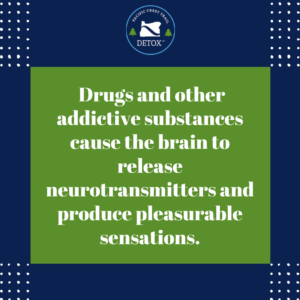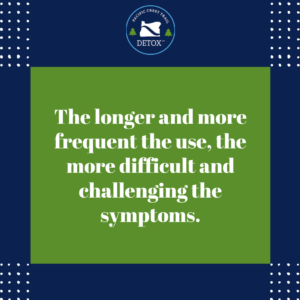Withdrawal is when your body misses a substance it’s used to. Imagine feeling a lot of difficult emotions all at once and wanting an escape.
When you stop using the substance, your body can react strongly. You might feel moody or have a hard time sleeping. It’s like your body is asking for the substance because it thinks it needs it to feel okay.
In this blog, we’ll explore why this happens, the different withdrawal symptoms one may experience, and coping mechanisms to manage them.

Withdrawal: What It Is and Why It Happens
Withdrawal refers to the series of symptoms; emotional, physiological, and psychological, that occur when a person stops using an addictive substance. The body adapts when it is exposed to these substances so upon discontinuation, it attempts to regain its balance.
The use of substances trigger changes in the brain chemistry. Drugs and other addictive substances cause the brain to release neurotransmitters (chemical messengers that carry chemical signals or messages from one nerve cell to another). These neurotransmitters include dopamine and serotonin and they produce pleasurable sensations.
These sensations lead to a significant improvement in one’s mood. The brain’s chemistry and function changes to accommodate the presence of these substances. Over time, one becomes tolerant to the activities it induces.
When the substance is discontinued, a chemical imbalance is recreated. The body starts to readjust to its absence to regain normal function which is basically what happens during detox. The readjustment or detox process is what creates the uncomfortable experience during withdrawal, making it hard for many to break free from dependence.
The detox process is the only first step in the path to a substance free life and it can be the hardest due to the different symptoms likely to be experienced.
The presentation of withdrawal symptoms varies for different people and depends on several factors including the type of substance, duration of use, age, health condition, and withdrawal process. An understanding of the different symptoms is paramount to getting the needed assistance.
Physical Symptoms of Withdrawal
Sweating
This is a common symptom experienced during withdrawal from substances like alcohol, opioids, or stimulants. It can be due to the body’s efforts at regulating temperature in response to the stress and discomfort created.
Nausea and Vomiting
During withdrawal, you may feel gastrointestinal distress, causing nausea and vomiting. In severe cases, it contributes to dehydration and electrolyte imbalances.
Shaking
Shaking can occur in the hands or other body parts and ranges from mild tremors to full-body shaking. This is very likely to be experienced in alcohol and benzodiazepine withdrawal.
Muscle Aches and Pains
Muscle aches and pains create generalized discomfort that can make falling asleep a big struggle. It occurs after the discontinuation of opioids, cocaine, and certain prescription medications like adderall.
Headaches
Termination of the use of caffeine, opioids, and some prescription medication can trigger headaches or migraines. These headaches can be mild or intense and persistent.
Fatigue
Feelings of tiredness and lethargy are common after the cessation of substances. These feelings can be overwhelming and affect daily life.
Changes in Appetite
One may experience a loss of appetite during withdrawal. Stimulant withdrawal can cause a decrease in appetite, while marijuana withdrawal more commonly results in an increase in appetite.
Insomnia
Sleep disturbances worsen withdrawal symptoms and make already existing discomfort difficult to bear.
Increased Heart Rate
This is a symptom common during withdrawal from stimulants. A rise in blood pressure and increased blood rate can be especially dangerous for people with underlying cardiovascular conditions.
Respiratory Issues
Respiratory distress and even respiratory failure can occur during withdrawal from opioids. Common signs may include shallow breathing and difficulty breathing.

Emotional and Psychological Symptoms
Withdrawal symptoms can also be emotional and psychological and can be just as severe as physical symptoms.
Emotional Symptoms
Anxiety
Anxiety is a common emotional symptom during withdrawal. This can be feelings of restlessness or feelings of apprehension about the future.
Depression
This may occur alongside anxiety, causing persistent feelings of sadness, hopelessness, and reduced or lost interest in activities that were once enjoyable.
Psychological Symptoms
Cravings and obsessions are common psychological symptoms experienced during withdrawal. The mind is fixated on the substance, similar to what happens in infatuation. A train of intrusive thoughts fill the mind making concentration a herculean task and then there’s the persistent desire to use the substance in alleviating the discomfort.
Impact of Withdrawal on Mental Health
The array of symptoms that occur during withdrawal deeply impacts the mental health of the individual and can lead to worsening of existing conditions or triggering of new ones.
And while these symptoms may be inescapable, it’s less difficult to deal with when one has access to the right support system and professional care.
Factors Influencing Withdrawal Experiences
How long does withdrawal last? The longer and more frequent the use, the more difficult and challenging the symptoms. This is due to the heightened physical and psychological dependence on the substance over time.
Individual factors such as genetics, physiological differences, and underlying mental health conditions also influence withdrawal. Individuals with mental health conditions are likely to experience more intense symptoms due to the similarities in the neurobiological mechanisms at play.
However, support systems also play a vital role in shaping the withdrawal experience. Individuals with supportive relationships that have access to professional care cope better than individuals who attempt unassisted withdrawal.
Coping Mechanisms and Support Strategies
Effective coping mechanisms refer to the healthy ways one can manage the discomfort and challenges that come with withdrawal. Some of these mechanisms include:
- Meditation or yoga for managing stress and anxiety
- Physical exercise to improve your mood
- Healthy and balanced meals for stable energy levels
- Hydration to help remove toxins from the systems
- Healthy distractions such as reading and outdoor walks
- Journalling or art therapy
- Attending support group meetings
- Establishing a daily routine to help manage feelings of uncertainty and anxiety
In addition to arming yourself with the right coping mechanisms, being in the right support groups will greatly ease your recovery journey. Support groups offer empathy and understanding and you can bond with others over shared experiences. This can be a great source of encouragement and motivation for lasting sobriety.
Conclusion
Withdrawal can be stressful, draining, and lonely. It may last a few days, to weeks, months, and even years. The right professional care and support can, however, make the journey to sobriety more bearable. To access the best detox care in Oregon and manage withdrawal symptoms effectively, contact Pacific Crest Trail Detox today.


